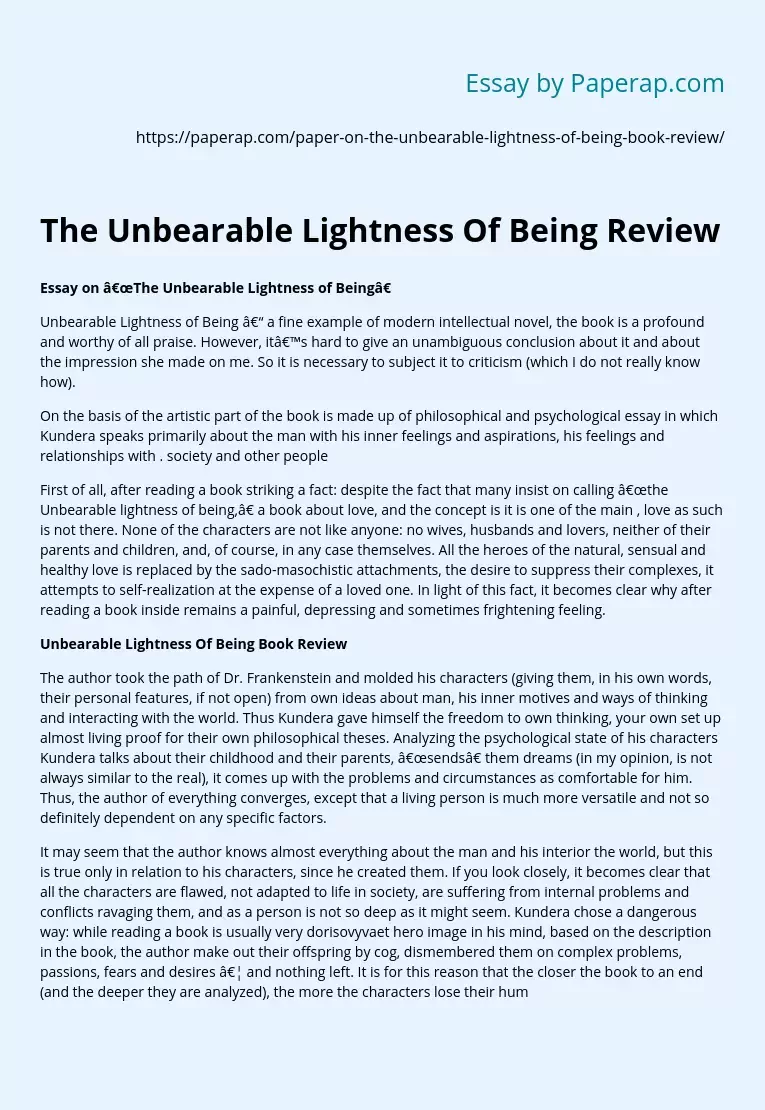The Unbearable Lightness Of Being Review
In the following sample essay, an essay on the topic “The Unbearable Lightness of Being.” Read the introduction, body and conclusion of the essay, scroll down.
Essay on “The Unbearable Lightness of Being”
Unbearable Lightness of Being – a fine example of modern intellectual novel, the book is a profound and worthy of all praise. However, it’s hard to give an unambiguous conclusion about it and about the impression she made on me. So it is necessary to subject it to criticism (which I do not really know how).
On the basis of the artistic part of the book is made up of philosophical and psychological essay in which Kundera speaks primarily about the man with his inner feelings and aspirations, his feelings and relationships with . society and other people
First of all, after reading a book striking a fact: despite the fact that many insist on calling “the Unbearable lightness of being,” a book about love, and the concept is it is one of the main , love as such is not there.
None of the characters are not like anyone: no wives, husbands and lovers, neither of their parents and children, and, of course, in any case themselves. All the heroes of the natural, sensual and healthy love is replaced by the sado-masochistic attachments, the desire to suppress their complexes, it attempts to self-realization at the expense of a loved one. In light of this fact, it becomes clear why after reading a book inside remains a painful, depressing and sometimes frightening feeling.
Unbearable Lightness Of Being Book Review
The author took the path of Dr. Frankenstein and molded his characters (giving them, in his own words, their personal features, if not open) from own ideas about man, his inner motives and ways of thinking and interacting with the world. Thus Kundera gave himself the freedom to own thinking, your own set up almost living proof for their own philosophical theses. Analyzing the psychological state of his characters Kundera talks about their childhood and their parents, “sends” them dreams (in my opinion, is not always similar to the real), it comes up with the problems and circumstances as comfortable for him. Thus, the author of everything converges, except that a living person is much more versatile and not so definitely dependent on any specific factors.
It may seem that the author knows almost everything about the man and his interior the world, but this is true only in relation to his characters, since he created them. If you look closely, it becomes clear that all the characters are flawed, not adapted to life in society, are suffering from internal problems and conflicts ravaging them, and as a person is not so deep as it might seem. Kundera chose a dangerous way: while reading a book is usually very dorisovyvaet hero image in his mind, based on the description in the book, the author make out their offspring by cog, dismembered them on complex problems, passions, fears and desires … and nothing left. It is for this reason that the closer the book to an end (and the deeper they are analyzed), the more the characters lose their humanity, liveliness.
Ironically, comes to mind comparisons with “Junkie” Burroughs, so It is very heavy on the atmosphere of the book, where almost all the characters do not look at people as we used to see them. However, all the characters in Burroughs – asocial, cut off from society and do not want to merge with him, while Kundera describes the “everyone”: a doctor, a window washer, waitress, photographer, artist, professor and others. And this is even worse, because if everyone around us may be such that these can be and we are. It’s scary, especially for those who will believe in the reality of the characters of the book, for those who have already had (albeit fleeting) experience disappointment in human nature, its purity. Unprepared reader and does not have a more or less clear ideas about the inner world of the people around him, this novel may enter into the alarm state and to sow seeds of doubt. (I think I will do some of his principles and dare to give you advice: do not unconditionally trust the author in his observations, because it’s still fiction.) Here lies the danger, but there is no doubt lies and strengths of the book: it makes us look for themselves, their own actions and desires is critical.
Just wanted to point out the ending of the novel, it seemed to me not too convincing. Kundera sees a fairly long period of life of his characters, watching their old age. Some sacrificed in advance, making it possible to complete the book at any time. One gets the feeling that the characters do not remain unparsed something to say about them in the long run is nothing more, so it is logical to finish the book. The history of human disease ends or its recovery or death. This book does not recover one, is also not very clear whether it is prepared to the author to put the heroes of any diagnosis.
It’s hard to say with certainty how he Kundera sees his characters, and whether he was able to fully express his creative ideas. And if we talk about the vision of man and his nature, looming in this book, then with him, I can not agree, and for this I have a lot of bases. Apparently, because of that I could not enjoy reading this novel and I can not say that he loved me unconditionally. But, of course, to deny the reason why this book in its unquestionable cultural significance and call into question its artistic [demon] value would be at least silly.
The Unbearable Lightness Of Being Review. (2019, Dec 05). Retrieved from https://paperap.com/paper-on-the-unbearable-lightness-of-being-book-review/

